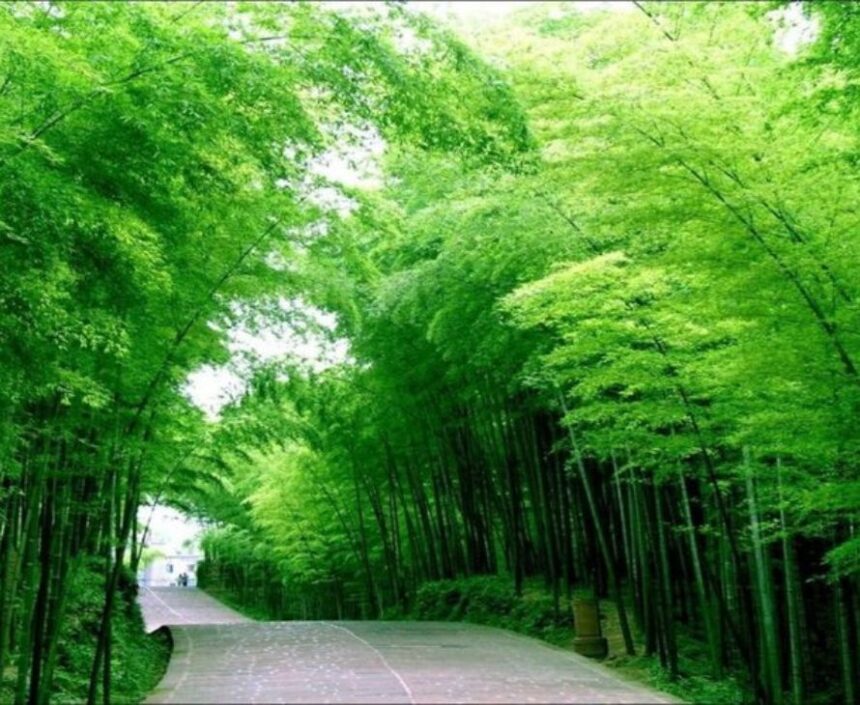In recent years, the world has become increasingly aware of the environmental challenges posed by plastic pollution. With millions of tons of plastic waste generated annually, finding sustainable alternatives has become a pressing necessity. One potential solution that has been gaining attention is the use of bamboo, particularly in countries like China, where vast bamboo forests thrive.
The Plastic Problem
Plastic has become ubiquitous in our daily lives, from packaging to household items. However, its durability, while advantageous, also means that it can persist in the environment for hundreds of years. Single-use plastics, in particular, contribute significantly to pollution, harming wildlife and ecosystems. As nations grapple with the consequences of plastic waste, the search for sustainable alternatives has intensified.
Bamboo: A Sustainable Resource
Bamboo is a fast-growing, renewable resource that has been used for centuries in various cultures, especially in Asia. It is a grass that can grow up to three feet in a single day and is capable of reaching maturity in just three to five years. This rapid growth rate makes bamboo significantly more sustainable than traditional timber sources, which can take decades to mature.
China is home to over half of the world’s bamboo species and has long recognized the potential of this versatile plant. Bamboo can be used to create a wide range of products, including textiles, paper, and construction materials. Its strength, flexibility, and lightweight properties make it an excellent candidate for replacing plastic in many applications.
Bamboo vs. Plastics: The Comparison
Biodegradability
One of the most significant advantages of bamboo is its biodegradability. Unlike plastic, which can take centuries to decompose, bamboo can break down naturally within months under the right conditions. This characteristic could significantly reduce the long-term environmental impact associated with plastic waste.
Carbon Sequestration
Bamboo forests play a crucial role in carbon sequestration. They absorb carbon dioxide at a higher rate than many tree species, making them an effective tool in combating climate change. By promoting bamboo cultivation, we can enhance carbon capture while simultaneously providing an alternative to fossil fuel-based plastics.
Resource Efficiency
The cultivation of bamboo requires less water and fewer pesticides compared to conventional crops. This efficiency not only makes bamboo a more sustainable option but also supports the health of surrounding ecosystems.
Economic Opportunities
The bamboo industry presents economic opportunities for rural communities in China and beyond. By investing in bamboo cultivation and processing, communities can create jobs and stimulate local economies while contributing to environmental sustainability.
Challenges to Overcome
Despite the numerous advantages of bamboo, there are challenges to its widespread adoption as a substitute for plastic. The infrastructure for bamboo processing and distribution is still underdeveloped in many regions. Additionally, there needs to be greater public awareness and acceptance of bamboo products over traditional plastics.
Moreover, while bamboo can replace certain plastic applications, it is not a one-size-fits-all solution. For instance, bamboo may not be suitable for specific high-performance applications currently served by plastics, such as certain medical devices or complex packaging solutions.
While bamboo forests in China present a promising avenue for addressing the plastic pollution crisis, they are not a panacea. The transition from fossil plastics to sustainable alternatives requires a multi-faceted approach that includes reducing consumption, improving recycling systems, and investing in innovative materials. Bamboo can certainly play a significant role in this transition, offering a renewable, biodegradable alternative to many plastic products. By harnessing the potential of bamboo, we can take meaningful steps toward a more sustainable future, reducing our reliance on fossil fuels and mitigating the impact of plastic pollution on our planet.
Promoting bamboo cultivation in rural areas can have a variety of significant economic impacts, such as:
Job Creation
Bamboo cultivation and processing can generate employment opportunities in rural communities. This includes jobs related to planting, harvesting, and processing bamboo into various products, as well as roles in transportation and sales. Increased employment can lead to improved livelihoods and reduced poverty levels in these areas.
Diversification of Income
Bamboo provides farmers with an alternative source of income. By diversifying their agricultural activities, farmers can shield themselves from the risks associated with relying on a single crop. This can enhance economic resilience in rural communities, especially in the face of climate change or market fluctuations.
Development of Local Industries
Investing in bamboo cultivation can lead to the establishment of local industries focused on bamboo processing. This could include manufacturing bamboo products such as furniture, flooring, textiles, and crafts, which can be sold domestically and internationally. The growth of local industries can stimulate the economy and encourage entrepreneurship.
Increased Agricultural Productivity
Bamboo can be intercropped with other crops, enhancing agricultural productivity. The presence of bamboo can improve soil quality, reduce erosion, and provide shade for other plants. This synergistic relationship can lead to higher yields and better resource utilization.
Export Opportunities
With the global demand for sustainable and eco-friendly products on the rise, bamboo presents significant export potential. Countries that invest in bamboo cultivation can tap into international markets, selling bamboo products to consumers seeking alternatives to plastics and non-sustainable materials.
Infrastructure Development
Promoting bamboo cultivation can lead to improvements in rural infrastructure. Increased economic activity may necessitate better transportation networks, storage facilities, and processing plants. This infrastructure development can benefit the broader rural community and enhance access to markets.
Eco-Tourism Potential
Bamboo forests can attract eco-tourism, offering opportunities for rural areas to generate income through tourism-related activities. Nature trails, workshops, and bamboo-themed experiences can draw visitors, providing an additional revenue stream for local communities.
Environmental Benefits Leading to Economic Gains Bamboo cultivation contributes to environmental sustainability by improving carbon sequestration and reducing soil erosion. Healthier ecosystems can lead to improved agricultural productivity and resilience, further supporting the economic stability of rural areas.
Community Development and Empowerment
As communities engage in bamboo cultivation, they can become more organized and empowered. This can lead to the formation of cooperatives and collective marketing efforts, allowing farmers to negotiate better prices and access resources more effectively.
The promotion of bamboo cultivation in rural areas holds considerable potential for economic transformation. By creating jobs, diversifying income sources, fostering local industries, and enhancing environmental sustainability, bamboo can contribute to the overall development and prosperity of rural communities. To maximize these benefits, it is essential to implement supportive policies and provide access to training, resources, and markets for local farmers and entrepreneurs.
ALSO READ: China’s green transformation in road infrastructure: Leading the way to a sustainable future













